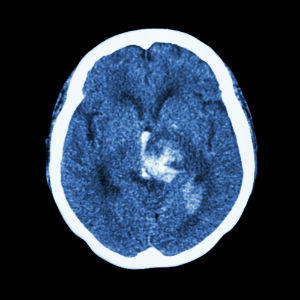An employee who suffers a work-related brain injury may need extensive treatment and an extended period of time off work for treatment and recovery.

A work-related head or brain injury can have life altering consequences for the injured worker. One of the most serious effects of brain trauma is a complication known as intracerebral hemorrhage, which if left untreated can lead to death.
Intracerebral Hemorrhage
Intracerebral hemorrhage is a type of hemorrhagic stroke, which can be caused by a number of factors, the most common one being head injuries. Intracerebral hemorrhage causes bleeding within the brain and eventually causes the death of surrounding cells. Bleeding within the brain tissues can lead to further complications such as stroke and temporary and permanent loss of brain function.
Signs and Symptoms of Intracerebral Hemorrhage
Intracerebral hemorrhage involves brain damage and the symptoms may appear in a number of ways. Some patients may experience mild symptoms, while others may show severe symptoms requiring urgent medical intervention. Common symptoms of intracerebral hemorrhage include:
- severe headaches, which does not subside with regular painkillers
- seizures
- extreme nausea and vomiting
- loss of fine motor skills or motor functions
- loss of coordination and balance
- loss of consciousness
- lethargy
- decrease in awareness
Diagnosis of Intracerebral Hemorrhage
Intracerebral hemorrhage is hard to diagnose, because the symptoms mimic many other conditions related to brain damage. Imaging techniques are used to diagnose an intracerebral hemorrhage. An MRI or CT scan may be used to detect bleeding and assess damage to the brain tissue. Depending on the results of the imaging tests, a doctor would be able to tell what part of the brain has been damaged and recommend the appropriate treatment accordingly.
Treatment of Intracerebral Hemorrhage
- prescription painkillers, corticosteroids, diuretics
- anticonvulsants in case the patient is having seizures
- surgery
Intracerebral Hemorrhage and Workers’ Compensation
An employee who suffers a work-related head or brain injury may need to undergo prolonged treatment and may need an extended period of time off work for treatment and recovery. The injured employee can seek medical and temporary or permanent disability benefits under the workers’ compensation system. If you feel you are not getting the best medical treatment or your full benefits, immediately consult an experienced Missouri workers’ compensation lawyer for help. Call The Law Office of James M. Hoffmann at (314) 361-4300 for a case evaluation.
Work Related Injuries
Work Related ACL Injury
Leg Amputation
Finger Amputation
Ankle Injury
Ankle Replacement
Arthroscopic Surgery
Work Related Arthritis
Accidental Asphyxiation
Work Related Asthma
Avulsion Injury
Back Injury at Work
Back Pain from Work
Lower Back Pain at Work
Chronic Back Pain
Head Injury Internal Bleeding
Internal Bleeding after Injury
Blood Related Illness
Broken Bones
Brain Injuries
Traumatic Brain Injury
Bursitis Work Related
Burn Injury at Work
Electric Burn
Chemical Burn
Calcaneus Fracture
Sudden Cardiac Arrest
Cardiovascular Disease
Carpal Tunnel Work Related
Cartilage Injury
Cervical Disc Replacement
Cervical Fusion
Chronic Illness
Work Related Chronic Pain
Work Related Concussion
Contagious Disease
Work Related COPD
Skin Corrosion
CRPS Disease
Crush Injuries
Cubital Tunnel Syndrome
Work Related Death
Degenerative Bone Disease
Degenerative Disc Disease Work Related
Reflex Sympathetic Dystrophy
Work Related Tennis Elbow
Elbow Injury
Epicondylitis at Work
Work Related Eye Injury
Fibromyalgia
Work Related Foot Injuries
Work Related Injuries to the Hand
Hand Arm Vibration Syndrome
Work Related Head Injury
Closed Head Injury
Open Head Injury
Work Related Hearing Loss
Heart Attack Work Related
Stroke at Work
Heat Stroke at Work
Intracerebral Hemorrhage
Hernia Work Related Injury
Work Related Herniated Disc
Hip Fracture
Hip Replacement
Hip Injuries
Intracranial Injury
Broken Jaw
Work Related Knee Injuries
Knee Fracture
Laceration
LCL Injury
Legionnaires Disease
Ligament Tear
Limb Loss
Lumbar Disc Replacement
Lumbar Fusion
Lumbar Spinal Fusion
MCL Tear
MCL Injury
Meniscus Tear
Work Related Mental Illness
Mesothelioma from Work
Work Related Muscle Problems
Work Related Neck Pain
Work Related Neck Injury
Nerve Damage from Work Related Injury
Neurological Disorders
Occupational Disease
Organ Damage
Pain and Suffering from Work Related Injury
Paralysis
Patella Fracture
Pelvic Fracture
Plantar Fascitis
Pre Existing Work Related Injury
Work Related PTSD
Radiation Sickness
Repetitive Stress Injury
Rhabdomyolysis
Rotator Cuff Tear
Rotator Cuff Surgery
Work Related Rotator Cuff Injury
Sciatica Work Related
Shift Work Disorder
Shoulder Fusion
Shoulder Impingement
Shoulder Injury
Work Related Shoulder Pain
Sick Building Syndrome
Skull Fracture
Spinal Cord Injury at Work
Spondylolysis
Sprain at Work
Work Related Repetitive Strain Injury
Work Related Stress
Stress Fracture
Subdural Hematoma
Work Related Tendonitis
Lost Tooth at Work
Trigger Finger Work Related
Vertebroplasty
Vision Impairment
Lost Vision at Work
Work Related Wrist Injuries
